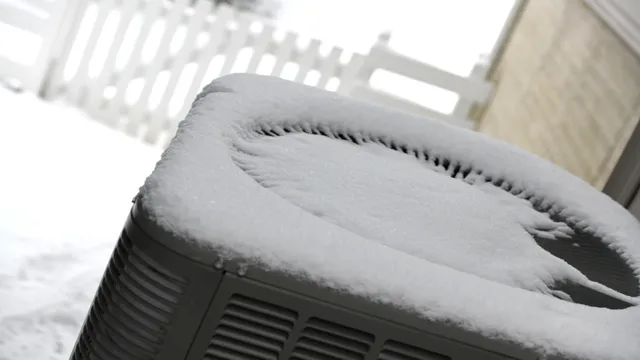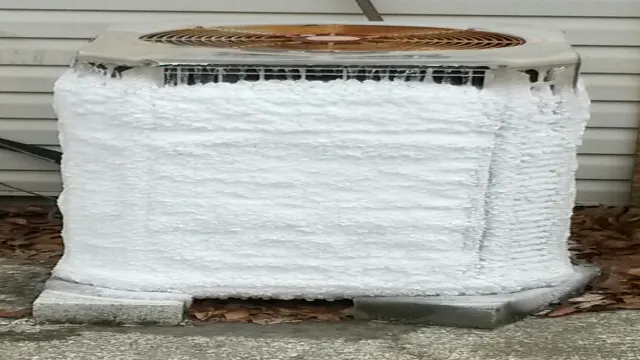During those cold winter months, we rely on our heating systems to keep us comfortable and warm. But imagine the frustration when your HVAC system freezes up, leaving you with no heat on a chilly night. Frozen HVAC systems are a common problem during the winter season.
Luckily, knowing what causes it and how to avoid it can save you from all the trouble. In this blog, we’ll dive into frozen HVAC systems, their causes, and solutions to prevent them from happening. So, get ready and keep reading to stay warm this winter!
Winter Weather’s Impact on HVAC
During winters, HVAC systems are prone to getting frozen due to condensation, creating a range of issues and discomfort for homeowners. Icy weather can impede proper airflow, impact the compressors, and obstruct the refrigerant lines. Such problems can potentially damage the HVAC, leading to costly repairs or replacements.
One way to prevent this from happening is by investing in regular maintenance, including servicing, replacements, and upgrades of specific parts. As a homeowner, it’s crucial to pay attention to the external weather conditions by safeguarding the components surrounding the HVAC system from snow buildup or debris. Regularly checking and cleaning the air filters can also aid in keeping them clear of any accumulated dirt or debris that can obstruct the airflow.
In conclusion, preventative measures are a crucial step in safeguarding the longevity and efficiency of an HVAC system, specifically during the wintertime.
How Temperature Affects HVAC Operation
Winter weather can have a significant impact on the operation of HVAC systems. As temperatures drop, heating systems have to work harder to maintain a comfortable indoor temperature, which can lead to increased energy usage and higher utility bills. Moreover, cold weather can also lead to wear and tear on HVAC equipment, which can cause breakdowns or malfunctions.
Homeowners should therefore ensure that their HVAC systems are properly maintained and serviced before winter starts to prevent any unexpected breakdowns and to maximize energy efficiency. Additionally, homeowners may want to consider upgrading to a more energy-efficient HVAC system to reduce energy costs and lessen the environmental impact of heating their homes during the winter months. By taking these steps, homeowners can stay warm and comfortable throughout the winter while keeping their energy bills under control.

The Risks of Frozen HVAC in Winter
Winter weather can have a significant impact on HVAC systems, and one of the most common issues is frozen pipes. This can be attributed to the drop in temperature, which causes moisture in the pipes to freeze and expand, eventually leading to burst pipes. When the pipes freeze, the water flow is restricted, and the HVAC system has to work twice as hard to provide heat to the building.
This puts a lot of strain on the system, and it could lead to a breakdown or damage. It is important to take preventive measures to avoid frozen pipes, such as regularly checking the insulation on the pipes, ensuring proper airflow, and maintaining a consistent temperature indoors. By doing so, you can avoid the risks associated with frozen HVAC problems and ensure that your HVAC system runs smoothly throughout the winter season.
Common Causes of Frozen HVAC
If you’re experiencing a frozen HVAC unit in the middle of winter, there could be a few common causes to blame. One of the most frequent culprits is a dirty air filter. When your air filter becomes clogged with dirt and debris, it can restrict airflow and cause your evaporator coils to freeze over.
Another possible cause is a malfunctioning thermostat, which can lead to improper temperature control and cause your system to work harder than necessary. Additionally, low refrigerant levels can lead to frozen coils, as can issues with your fan motor or blower. Whatever the cause, it’s crucial to address the issue as soon as possible to prevent further damage to your system and ensure your home stays warm and comfortable.
Blocked Airflow and Dirty Coils
Blocked airflow and dirty coils can cause a host of issues for your HVAC system, including the dreaded frozen unit. One of the most common culprits of blocked airflow is a dirty air filter, which can quickly become clogged with dust and debris, impeding the flow of air through your system. This can cause your evaporator coils to become too cold, leading to ice buildup and ultimately a frozen unit.
Additionally, dirty coils can also impede airflow and cause similar issues. It’s important to regularly clean or replace your air filter and have your coils cleaned professionally to ensure proper airflow and prevent frozen HVAC systems. So, if you notice your system is struggling to maintain a consistent temperature or you see ice accumulation on your unit, it’s time to investigate potential issues and schedule a cleaning or inspection.
Low Refrigerant Levels and Pressure
One of the most common causes of a frozen HVAC system is low refrigerant levels and pressure. This occurs when there is not enough refrigerant in the unit to properly cool the air. The refrigerant is responsible for absorbing heat from the air and then releasing it outside, but when there is not enough refrigerant, the system can’t effectively do its job.
This can lead to a buildup of ice on the evaporator coils, which causes the system to work harder to cool the air. Over time, this can cause the system to fail altogether if left untreated. Regular maintenance and inspections by a professional HVAC technician can help detect and fix issues with low refrigerant levels before they cause serious damage.
So if you notice any signs of a frozen air conditioner, such as reduced airflow or ice buildup, it may be time to call in the experts to help troubleshoot the problem.
Thermostat Malfunctions and Settings
One of the most common causes of frozen HVAC systems is a malfunctioning thermostat. A thermostat is designed to regulate temperature and signal the HVAC system to turn on or off accordingly. If the thermostat is faulty, it may misinterpret the indoor temperature and signal the system to continue running even when it’s not needed.
This can cause the evaporator coil to freeze, hindering the flow of air and potentially damaging the compressor. Another issue related to thermostats is incorrect settings. If the thermostat is set too low during colder winter months, the HVAC system may be forced to work harder than necessary, leading to overheating and eventually freezing.
It’s essential to ensure that thermostats are properly calibrated and set to the appropriate temperature to avoid frozen HVAC systems. In cases of malfunction, it’s best to consult with a professional HVAC technician to replace or repair the thermostat.
Solutions for Frozen HVAC
Winter can be a challenging season for HVAC systems as they are prone to freezing due to the extreme cold. However, there are effective solutions to prevent or resolve this problem. One way is to regularly change the air filters as dirty or clogged filters reduce airflow, which can cause the coils to freeze.
Another solution is to check the refrigerant levels and recharge as needed, as low refrigerant levels can also cause the coils to freeze. If the system is already frozen, it’s best to turn off the unit and let the ice thaw naturally. Using a hairdryer or hot water can damage the unit.
To avoid future freezing, ensure there is proper insulation and sealing around the unit to prevent cold air from entering or warm air from escaping. In summary, preventative maintenance and following these simple solutions can help to ensure your HVAC system runs efficiently during the winter months.
Improve Airflow and Clean Coils
If your HVAC system has frozen, you’re likely experiencing some discomfort in your home. Fortunately, there are solutions to this issue that can restore your system’s function and keep your home comfortable. One solution is to improve the airflow in your system.
This can be done by checking and replacing any clogged air filters and ensuring that air vents are not blocked by furniture or other objects. Additionally, regularly cleaning your system’s coils can also improve airflow and prevent freezing. Dust and debris can accumulate on the coils, limiting their ability to transfer heat and causing them to freeze.
By removing this buildup, you can restore proper function to your HVAC system. With these solutions, you can prevent frozen HVAC systems and keep your home comfortable year-round.
Check and Address Refrigerant Levels
If you’re dealing with a frozen HVAC, the first thing you should do is check the refrigerant levels. Often, a low refrigerant level can cause the evaporator coil to freeze, which can lead to major performance issues. If you do find low refrigerant levels, you will need to add more to your system.
Of course, this is not something you should attempt on your own. Adding refrigerant to an HVAC system should only be done by a licensed HVAC professional to ensure safety and proper functioning. Once your refrigerant levels are back to normal, you may also need to address any leaks that may have caused the low level in the first place.
By taking these steps, you can prevent further damage to your HVAC system and ensure it’s working efficiently once again.
Inspect and Reset Thermostat Settings
When the winter season arrives, one of the most common problems households face is a frozen HVAC system. Fortunately, there are solutions available to resolve this issue. One thing to check is the thermostat settings, which can affect your HVAC system’s performance.
Inspect the thermostat and ensure that it is set to the proper temperature for your home. Additionally, try resetting the thermostat to see if this resolves the problem. Another cause of a frozen HVAC system could be dirty air filters.
If air filters are clogged, airflow can be restricted, causing the system to freeze over. Therefore, make sure to clean or replace air filters regularly to keep your HVAC system working efficiently. By keeping an eye on these problems, you can address them quickly and prevent your HVAC system from freezing over during winter.
Conclusion
In conclusion, if your HVAC system is frozen in the winter, it’s like seeing a penguin on a tropical beach – it just doesn’t belong there. Don’t let Jack Frost’s icy grip leave your home feeling like the North Pole; be sure to keep up with regular maintenance and avoid letting your system run low on refrigerant. Because let’s face it, nobody wants to huddle under blankets while their heater takes a winter hiatus.
Keep your HVAC system happy and healthy, and you’ll be living in cozy comfort all season long.”
FAQs
How can I prevent my HVAC unit from freezing during winter?
You can prevent your HVAC unit from freezing by ensuring that it is properly insulated, regularly changing the air filter, and having it maintained by a professional HVAC technician.
What are some signs that my HVAC unit is frozen?
Some signs that your HVAC unit is frozen include reduced airflow, strange noises, and frost or ice buildup on the unit.
Can I thaw my frozen HVAC unit myself?
It is not recommended to attempt to thaw a frozen HVAC unit yourself. It is best to contact a professional HVAC technician to safely thaw and repair your unit.
How can I maintain my HVAC unit during winter to prevent freezing?
Some ways to maintain your HVAC unit during winter include keeping the area around the unit clear of debris, regularly checking for ice buildup, and scheduling regular maintenance with a professional HVAC technician.

